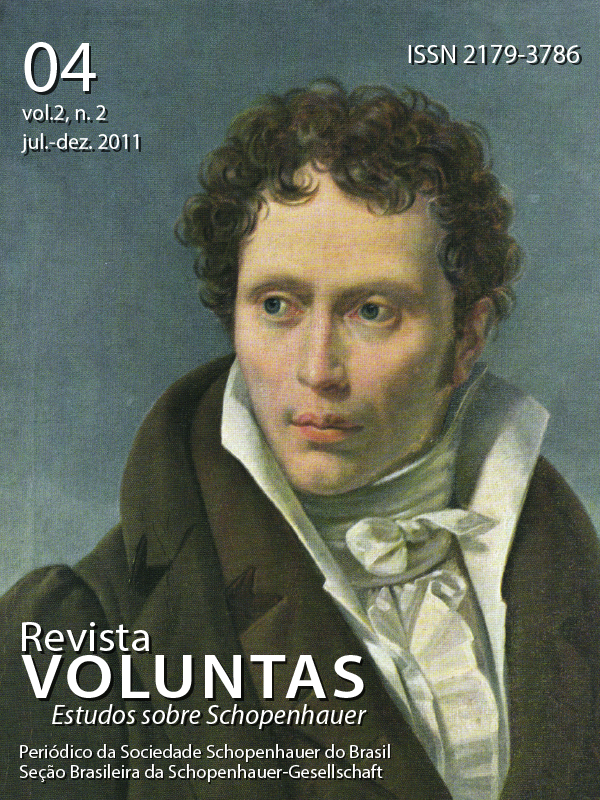“What makes Human Beings into Moral Beings?” The Significance of Ethics in the Process of Evolution
DOI:
https://doi.org/10.5902/2179378634075Schlagworte:
Evolutionary ethics, animal empathy, VivisectionAbstract
Just as animals in general are described as “feeling” nothing like “pain” but “stimuli responses” or “behaviours,” scientific theorists once proposed to reduce the differences between socio-cultural expressions of pain to differences in general between the races: Black, White, Asian, and especially so-called aboriginal peoples and Nazi experiments on human pain extended the same test of pain thresholds from experiments performed on animals for centuries (the same experiments on animals unchecked to this day) to human beings designated as subhuman. Ethological studies by Franz de Waal suggest that animals share this capacity for sympathizing with the other. Schopenhauer’s notion of compassion thus serves as the basis for a new understanding of becoming moral. This essay situates Schopenhauer with respect to Kant as well as Nietszche and develops connections with Levinas and Adorno as well as Isaac Bashevis Singer.Downloads
Literaturhinweise
BEAUVOIR, Simone de. Second Sex, (New York: Random House, 1989 [1949]).
BABETTE, Babich. “Adorno on Science and Nihilism, Animals, and Jews.” Symposium: Canadian Journal of Continental Philosophy/Revue canadienne de philosophie continentale, Vol. 14, Nº 1, (2011).
BABETTE, Babich. “On the Analytic-Continental Divide in Philosophy: Nietzsche’s Lying Truth, Heidegger’s Speaking Language, and Philosophy,” In: PRADO, C. G., [Ed.] A House Divided: Comparing Analytic and Continental Philosophy (Amherst, NY: Humanity
Books, 2003).
BABETTE, Babich [Ed.]. Nietzsche, Habermas, and Critical Theory (Amherst, NY: Humanity Books, 2004).
BABETTE, Babich. Words in Blood, Like Flowers: Philosophy and Poetry, Music and Eros in Hölderlin, Nietzsche, and Heidegger (Albany: State University of New York Press, 2006/2007).
BARTAL, Inbal Ben-Ami; DECETY, Jean; MASON, Peggy. “Empathy and Pro-Social Behavior in Rats,” Science, Vol. 334, no. 6061 (9 December 2011): 1427-1430.
EISNITZ, Gail. Slaughterhouse: The Shocking Story of Greed, Neglect and Inhumane Treatment Inside the U.S. Meat Industry (Amherst, NY: Prometheus, 1997).
ERWIN, Dennis; STORY, Matt (Babich interviewed). “An Impoverishment of Philosophy,” Purlieu: Philosophy and the University (2011): 37-71.
IMHOFF, Daniel [Ed.]. CAFO: The Tragedy of Industrial
Editions, 2010).
JONES, James H. Bad Blood: The Tuskegee Syphilis Experiment—A Tragedy of Race and Medicine (New York: Free Press, 1982 edition).
JOLY, Alison. “That, There Is Me,” London Review of Books, Vol. 23, No. 18 (20 September 2001): 11-12.
KANT, Immanuel. The Critique of Pure Reason, trans. Norman Kemp-Smith (London: Palgrave-Macmillan, 203).
KRIMSKY, Sheldon. Science in the Private Interest (Lanham. MD: Rowman and Littlefield, 2003).
MARKUS, Erik. Meat Market: Animals, Ethics, and Money (Brio Press, 2005).
PATTERSON, Charles. Eternal Treblinka: Our Treatment of Animals and the Holocaust (New York: Lantern Books, 2002).
REVERBY, Susan M. Examining Tuskegee: The Infamous Syphilis Study and Its Legacy (The University of North Carolina Press, 2009).
ROBERTS, Catherine. Science, Animals, and Evolution: Reflections on Some Unrealized Potentials of Biology and Medicine (Westport, CT: Greenwood, 1980).
SCHOPENHAUER, Arthur. On the Basis of Morality, trans. E.F. J. Payne (Providence/Oxford: Berghahn Books, 1995 [1965]), p. 111. Über die Grundlage der
Moral, In: Schopenhauer, Werke in Einem Bande (Munich: Hanser, 1977).
SCULLY, Matthew. Dominion: The Power of Man, the Suffering of Animals, and the Call to Mercy (New York: St. Martin’s Press, 2002).
SMALL, Robin. Basic Writings (Chicago: University of Illinois Press, 2003).
SPIEGEL, Marjorie. The Dreaded Comparison: Human and Animal Slavery (New York: Mirror Books, 1997).
TREIBER, Hubert Treiber [Ed.]. Paul Rée: Gesammelte Werke, 1875-1885 (Berlin and New York: Walter de Gruyter Verlag, 2004).
VISVANATHAN, Shiv. “On the Annals of the Laboratory State,” In: NANDY, Ashis [Ed.] Science, Hegemony, and Violence: A Requiem for Modernity (Oxford: Oxford University Press, 1988), pp. 257–288.
WAAL, Frans de [Ed.]. Tree of Origin: What Primate Behaviour Can Tell Us about Human Social Evolution (Cambridge: Harvard University Press, 2001).
WAAL, FRANS DE [ED.]. The Ape and the Sushi Master: Cultural Reflections by a Primatologist (London: June 2001).
WARRICK, Joby. “They Die Piece by Piece”. In: “Overtaxed Plants, Humane Treatment of Cattle Is Often a Battle Lost” Washington Post, Apr 10, 2001.
WASHINGTON, Harriet. Medical Apartheid: The Dark History of Medical Experimentation on Black Americans from Colonial Times to the Present (New York: Anchor, 2008).
Downloads
Veröffentlicht
Zitationsvorschlag
Ausgabe
Rubrik
Lizenz
Die Einreichung von Originalen an diese Zeitschrift impliziert seitens der Autoren die Übertragung der Rechte zur gedruckten und digitalen Veröffentlichung. Die Urheberrechte für die publizierten Artikel liegen beim Autor, wobei der Zeitschrift das Recht zur Erstveröffentlicheng zukommt. Die Autoren dürfen dieselben Resultate in anderen Publikationen verwenden, wenn sie deutlich auf unsere Zeitschrift als ursprüngliches Publikationsmedium hinweisen.
Lizenz
Creative Commons Namensnennung - Nicht-kommerziell - Weitergabe unter gleichen Bedingungen 4.0 International (CC BY-NC-SA 4.0).






